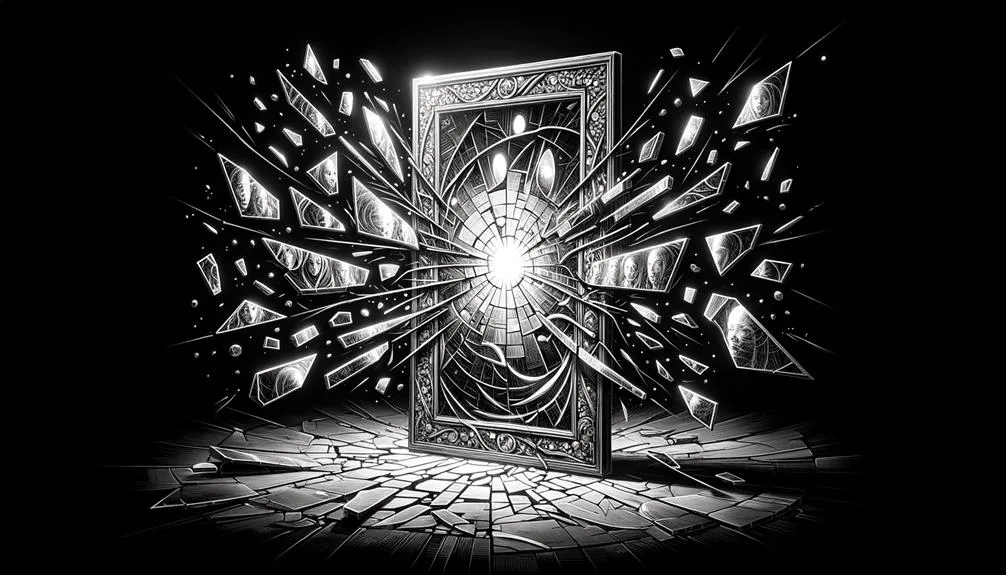Are you ready to step into the mirror of self-image, where the reflection holds the key to unlocking your hidden potential?
Prepare to embark on a journey of self-discovery as we navigate the intricate pathways of psychology's guide to understanding the power of self-image.
Within these pages, you will uncover the secrets that lie beneath the surface, unraveling the profound impact that self-image has on your well-being.
Brace yourself for a captivating exploration that will leave you yearning for more, as we delve into the depths of the human psyche and reveal the limitless possibilities that await.
Key Takeaways
- Self-image is an important component of self-concept and contributes to our overall identity.
- Having a negative self-image can influence our self-esteem.
- Self-image is influenced by factors such as self-perception, interpretation of others' perceptions, and the ideal self.
- Building a positive self-image involves recognizing our strengths, achievements, and the support we have received from others.
Understanding Self-Image and Self-Esteem
Understanding the relationship between self-image and self-esteem is crucial in comprehending the impact of our perceptions of ourselves on our overall sense of self-worth.
Self-image, influenced by factors such as the media, plays a significant role in shaping our self-esteem. The media bombards us with images of what's considered ideal, leading us to compare ourselves and often feel inadequate. This can have a detrimental effect on our self-esteem.
However, self-compassion can play a vital role in building and maintaining healthy self-esteem. By practicing self-compassion, we learn to be kind and understanding towards ourselves, embracing our imperfections and valuing our own worth.
It allows us to cultivate a positive self-image, irrespective of societal standards, leading to improved self-esteem and a greater sense of self-worth.
Elements and Dimensions of Self-Image

The relationship between self-image and self-esteem is crucial in comprehending the impact of our perceptions of ourselves on our overall sense of self-worth. To understand self-image more deeply, let's explore its elements and dimensions:
- Interpreting self-perception: Self-image involves how we perceive ourselves, both internally and externally. It's influenced by our thoughts, beliefs, and experiences.
- Evaluating moral dimension: Moral dimension is one of the dimensions of self-image. It relates to our values, ethics, and sense of right and wrong. It plays a significant role in shaping our self-image.
- Physical, psychological, and intellectual dimensions: These dimensions encompass how we perceive our physical appearance, emotional well-being, cognitive abilities, and intellectual capacity.
- Skills dimension: This dimension focuses on the skills and talents we possess, which contribute to our self-image.
Understanding the elements and dimensions of self-image provides us with a framework to evaluate ourselves and cultivate a positive self-image. It allows us to recognize the complexity of self-perception and the importance of moral values in shaping our overall sense of self-worth.
Building a Positive Self-Image

To develop a positive self-image, it's important to engage in self-reflection and acknowledge your unique qualities and accomplishments. Self-image plays a crucial role in personal growth as it affects how you perceive yourself and how you interact with the world around you.
Cultivating a positive self-image in adults involves several strategies. Firstly, practice self-acceptance and self-compassion by embracing your flaws and treating yourself with kindness.
Secondly, focus on your strengths and achievements, creating a list of your accomplishments and reminding yourself of them regularly.
Thirdly, surround yourself with supportive and positive people who uplift and encourage you. Additionally, engage in activities that make you feel confident and competent, such as pursuing hobbies or learning new skills.
Lastly, challenge negative self-talk and replace it with positive affirmations. By implementing these strategies, you can cultivate a positive self-image and experience personal growth.
Promoting Positive Self-Image in Adolescents

Promote self-acceptance and foster a supportive environment to cultivate positive self-image in adolescents. It's crucial to recognize the importance of self-image in social relationships, as it directly affects how adolescents perceive themselves and interact with others.
In today's digital age, the impact of social media on adolescent self-image can't be ignored. The constant exposure to carefully curated online personas can lead to unrealistic comparisons and feelings of inadequacy. To counteract these negative influences, it's essential to promote healthy body image by encouraging acceptance and appreciation of one's unique physical attributes.
Additionally, adolescents should be encouraged to set and achieve goals, as this fosters a sense of accomplishment and boosts self-esteem. Providing opportunities for self-expression and exploration further enhances their self-image by allowing them to discover and develop their individual strengths and interests.
Understanding Self-Image in Psychology

Understanding self-image in psychology is essential for gaining insights into how individuals perceive themselves and how it influences their mental well-being. Self-image is shaped by various factors, including social interactions, cultural norms, personal experiences, and media influence. These factors can either enhance or diminish one's self-image.
Having a positive self-image has several beneficial effects on an individual's mental health. It promotes self-confidence, resilience, and a sense of worthiness. People with a positive self-image are more likely to set and achieve goals, have healthier relationships, and experience higher levels of life satisfaction.
On the other hand, a negative self-image can lead to low self-esteem, anxiety, depression, and a negative outlook on life. Understanding the factors influencing self-image and the effects of a positive self-image can guide psychologists in developing effective interventions to improve individuals' self-perception and overall well-being.
Frequently Asked Questions
How Does Self-Image Impact Our Relationships With Others?
Your self-image significantly impacts your relationships with others. It affects how you communicate and behave towards them. A positive self-image can lead to healthier connections, while a negative one may hinder effective communication and behavior patterns.
Can Self-Image Change Over Time?
Yes, your self-image can change over time. As you gain new experiences and perspectives, your perception of yourself can evolve, leading to personal growth and a changing self-image.
What Role Does Society Play in Shaping Our Self-Image?
Society plays a significant role in shaping our self-image. Media's impact, including unrealistic beauty standards, can influence how we perceive ourselves. Society's influence can shape our beliefs about what is considered attractive or desirable.
Are There Any Cultural Differences in the Perception of Self-Image?
Cultural influences and media representation can shape our perception of self-image. Different cultures may have varying ideals of beauty and body standards, impacting how individuals view themselves. Media plays a significant role in reinforcing these cultural norms.
How Does Technology and Social Media Affect Self-Image?
Technology and social media have a significant impact on your self-image. They can expose you to unrealistic standards, comparison, and cyberbullying. It's important to be aware of these influences and practice self-care in the digital world.
Conclusion
Now armed with the knowledge and tools provided in this exploration of self-image, you're ready to unlock the potential within yourself.
By understanding the elements and dimensions of self-image, building a positive self-image, and promoting it in adolescents, you can embrace the limitless possibilities that await.
Remember, the power of self-image lies in your hands, and with it, you can overcome adversity, enhance self-esteem, and guide others on their journey towards self-discovery.
Embrace the transformative effects of cultivating a positive self-image and unleash the power within.

